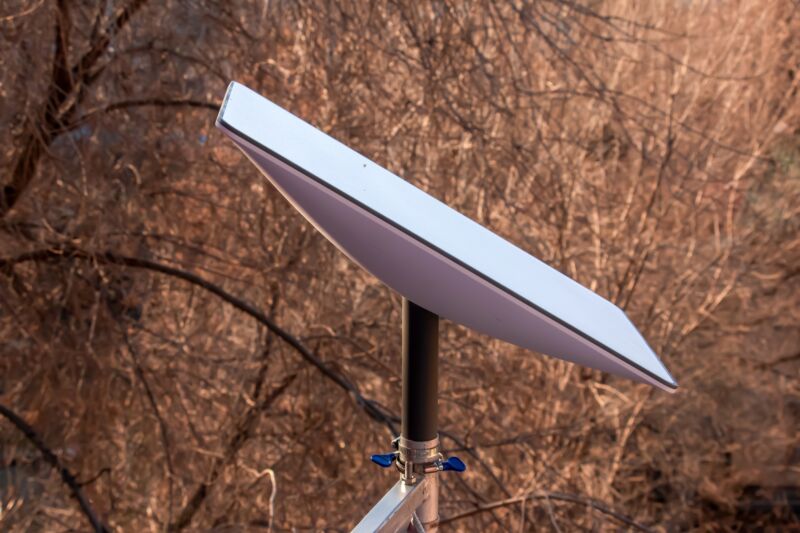
The Federal Communications Commission sided with Starlink in a battle against Dish Network today, rejecting a Dish proposal that could have degraded Internet service for Starlink satellite users. In a 4-0 vote, the FCC decided not to authorize high-powered terrestrial mobile service in the 12.2-12.7 GHz band that is already used by Starlink customer terminals for downloads.
The vote “ensure[s] the present and future of satellite services in the 12.2-12.7 GHz band. We recognize that millions of people rely on services in this band—and we want to see that continue,” FCC Chair Jessica Rosenworcel said at today’s meeting. The band is also used for satellite TV.
In its announcement of the vote, the FCC said it “declin[ed] to authorize two-way, high-powered terrestrial mobile use due to a significant risk of harmful interference to existing and emergent services, particularly in the growing satellite broadband market.”
Dish already uses spectrum from the 12.2-12.7 GHz band for satellite TV and wants to use the band for cellular service as well. While the FCC rejected the mobile proposal, it said it would investigate the potential to expand terrestrial fixed use or permit unlicensed use in that spectrum.
Specifically, the FCC will seek comment on allowing point-to-point fixed links in 12.2-12.7 GHz at higher power levels than the current rules allow and on “adding indoor-only underlay and unlicensed use.” The agency also teed up a plan that could eventually allow mobile broadband in the adjacent 12.7-13.25 GHz band.
Starlink urged users to fight Dish plan
Starlink asked users for help in its battle against Dish in June 2022, urging them to contact the FCC. “Dish has been attempting to claim new rights to the 12 GHz band, which is the spectrum you currently use to download content with Starlink,” the SpaceX subsidiary told customers at the time. “Despite technical studies dating back as far as 2016 that refute the basis of their claims, Dish has employed paid lobbyists who are attempting to mislead the FCC with faulty analysis in hopes of obscuring the truth.” The company claimed Dish’s plan would make “Starlink unusable for most Americans.”
“Thank you to the 100K+ Starlink customers who spoke up, the FCC voted to protect high-speed satellite Internet users from harmful interference,” Starlink wrote on Twitter today. Starlink broadband has already been getting slower as more people use the network, though performance could improve as new second-generation satellites are launched by SpaceX.
FCC Commissioner Geoffrey Starks, a Democrat, said he “would have welcomed a path forward that allowed both services to thrive” in 12.2-12.7 GHz, but that the evidence shows mobile use of the band would interfere with satellite. “Based on the studies filed to date, our engineers have concluded that high-powered mobile broadband, when deployed throughout the country, will interfere with established and emerging satellite services that serve millions of consumers,” Starks said.
Commissioner Nathan Simington, one of two Republicans on the FCC, said he is still “hopeful that there is a way to allow satellite and two-way high-power fixed wireless service to coexist in the 12.2 to 12.7 GHz band,” but that it isn’t technically feasible in the short term.
“The power levels and coverage profiles of terrestrial networks risk saturating [satellite receiver] arrays with interference from networks of powerful terrestrial transmitters, including via side lobes even when care is taken with terrestrial antenna angles,” Simington said. “Barring significant technology developments driving down the price and complexity of individual array elements while driving up quality, this will probably be the case for some time to come.”
https://arstechnica.com/?p=1940349

